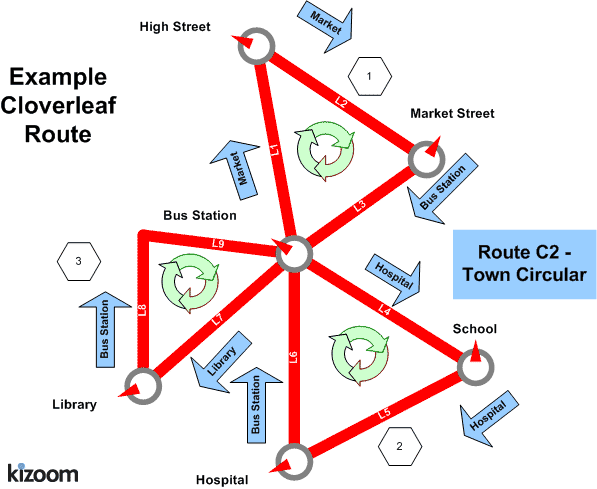TransXChange
Examples 2.0 - Cloverleaf route
Summary
The bus traces out the outline of a cloverleaf shape with three petals. All vehicle journeys have the same timings.
- Multiple routes composed of shared route sections.
- Multiple journey patterns composed of shared journey pattern sections.
- Visiting the same stop more than once within the same route.
- Dynamic destination displays.
- Short Working.
Published as: PDF
Route Map

Timetable
Bus Station to Bus Station
| #1 | #2 | #3 | #4 | #5 | |||
|---|---|---|---|---|---|---|---|
| 2 | 2 | 2 | 2 | 2 | |||
| Petal 1 | Bus Station | - | 11:00 | 12:00 | 13:00 | 14:00 | |
| High St | - | 11:03 | 12:03 | 13:03 | 14:03 | ||
| Market St | - | 11:07 | 12:07 | 13:07 | 14:07 | ||
| Petal 2 | Bus Station | - | 11:20 | 12:20 | 13:20 | 14:20 | |
| School | - | 11:29 | 12:29 | - | - | ||
| Hospital | - | 11:48 | 12:48 | - | - | ||
| Petal 3 | Bus Station | 11:00 | 12:00 | 13:00 | 13:20 | - | |
| Library | 11:19 | 12:19 | 13:19 | 13:39 | - | ||
| Bus Station | 11:31 | 12:31 | 13:31 | 13:51 | - |
The XML Representation
Service Registration
- The service is not registered.
- There is a single Operator.
Service Structure
- There is a single
Serviceinstance SV1, whose routes are all labelled as oneLine- '2'. - There are three
RouteSectioninstances, one for each leaf of the clover:- RS1, has three links between (L1) Bus Station to High Street, (L2) High Street to Market Street, (L4) Market Street to Bus Station.
- RS2, has three links between (L1) Bus Station to School, (L3) School to Hospital, (L5) Hospital to Bus Station.
- RS3, has two links between (L1) Bus Station to Library, and (L6) Library to Bus Station.
- There are five routes
Routeinstances defined:- R1, R2, R3, each with a single section (RS1,RS2, RS3 respectively) describing a single petal. (R2 is not actually used).
- R4 visits the first and third petals only (RS1 & RS3).
- R5 describes a route round all three petals, reusing the three sections (RS1,RS2, RS3) in succession.
- There are three
JourneyPatternSectioninstances JS1, JS2, and JS3, corresponding to the threeRouteSectioninstances, with corresponding journey pattern timing links. - There are five
JourneyPatterns,JP1 - JP5, composed from theJourneyPatternSectioninstances in the same way the routes are composed from the route sections. - There are five
VehicleJourneyinstances, one for each column:- VJ1 starting at 11:00 (column #1), references JP3 for its links, to run round the third petal.
- VJ2, starting at 11:00 (column #2), references JP5 for its links and so has eight vehicle journey timing links, corresponding to all eight journey pattern links,
- VJ3, starting at 12:00 (column #3), references VJ2 for its links, specifying only a different start time.
- VJ4 starting at 13:00 (column #4), references JP4 for its links, to run over the first and third petals.
- VJ5 starting at 11:00 (column #5), references JP1 for its links, running over just the first petal.
Operational Data
- The
DynamicDestinationDisplayis specified to change on certain links of the Journey pattern so that the heading changes between the outward and inward link, for instance for petal 1 at Bus Station and High Street it shows 'Market Street, but at Market Street, it shows 'Bus Station'.
Alternative XML Representation
Vehicle Journeys #1 & #5 could also be coded to use the same Route & Journey pattern as Vehicle Journey #2 , using start and end Dead Runs to indicate short workings for the route. R1, R5, JP1, JP5 would then not be needed.
Page last updated: 2005/11/01



